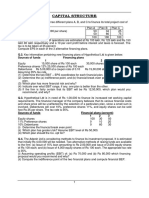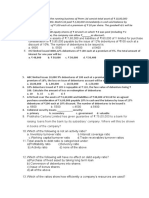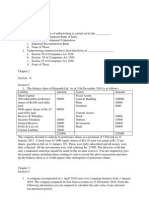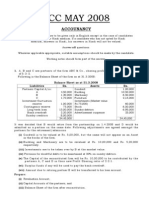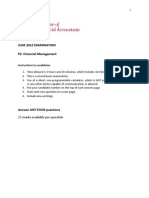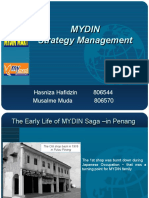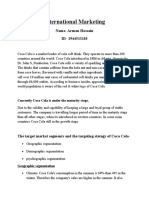0 ratings0% found this document useful (0 votes)
47 viewsQP - Corporate Accounts 2012
QP - Corporate Accounts 2012
Uploaded by
Joydip DasguptaThe document is an assessment for a corporate accounting class containing multiple choice and long answer questions.
Group A contains 6 multiple choice questions related to topics like holding company accounts, capital redemption reserve, securities premium account, and double account system.
Group B contains 3 long answer questions asking students to: 1) Pass journal entries and prepare a balance sheet after amalgamation of two companies. 2) Record journal entries for redemption of preference shares and bonus issue of equity shares. 3) Value a company's shares using asset backing and yield methods.
Copyright:
© All Rights Reserved
Available Formats
Download as DOCX, PDF, TXT or read online from Scribd
QP - Corporate Accounts 2012
QP - Corporate Accounts 2012
Uploaded by
Joydip Dasgupta0 ratings0% found this document useful (0 votes)
47 views2 pagesThe document is an assessment for a corporate accounting class containing multiple choice and long answer questions.
Group A contains 6 multiple choice questions related to topics like holding company accounts, capital redemption reserve, securities premium account, and double account system.
Group B contains 3 long answer questions asking students to: 1) Pass journal entries and prepare a balance sheet after amalgamation of two companies. 2) Record journal entries for redemption of preference shares and bonus issue of equity shares. 3) Value a company's shares using asset backing and yield methods.
Original Description:
self made Question Paper on Corporate Accounts
Original Title
QP_ Corporate Accounts 2012
Copyright
© © All Rights Reserved
Available Formats
DOCX, PDF, TXT or read online from Scribd
Share this document
Did you find this document useful?
Is this content inappropriate?
The document is an assessment for a corporate accounting class containing multiple choice and long answer questions.
Group A contains 6 multiple choice questions related to topics like holding company accounts, capital redemption reserve, securities premium account, and double account system.
Group B contains 3 long answer questions asking students to: 1) Pass journal entries and prepare a balance sheet after amalgamation of two companies. 2) Record journal entries for redemption of preference shares and bonus issue of equity shares. 3) Value a company's shares using asset backing and yield methods.
Copyright:
© All Rights Reserved
Available Formats
Download as DOCX, PDF, TXT or read online from Scribd
Download as docx, pdf, or txt
0 ratings0% found this document useful (0 votes)
47 views2 pagesQP - Corporate Accounts 2012
QP - Corporate Accounts 2012
Uploaded by
Joydip DasguptaThe document is an assessment for a corporate accounting class containing multiple choice and long answer questions.
Group A contains 6 multiple choice questions related to topics like holding company accounts, capital redemption reserve, securities premium account, and double account system.
Group B contains 3 long answer questions asking students to: 1) Pass journal entries and prepare a balance sheet after amalgamation of two companies. 2) Record journal entries for redemption of preference shares and bonus issue of equity shares. 3) Value a company's shares using asset backing and yield methods.
Copyright:
© All Rights Reserved
Available Formats
Download as DOCX, PDF, TXT or read online from Scribd
Download as docx, pdf, or txt
You are on page 1of 2
Page | 1
NABADWIP VIDYASAGAR COLLEGE
3
RD
INTERNAL ASSESSMENT
THIRD YEAR B.COM (H)
PAPER V-CORPORATE ACCOUNTING
FULL MARKS: 20, TIME: 45 MINUTES
GROUP A (ANSWER ANY FOUR QUESTIONS) [41=4]
1. In holding company accounts, degree of control depends upon holding of ______________
only
2. Transfer to Capital Redemption Reserve protects the interest of the ______________
3. Section ___________ of the Companies Act 1956 deals with treatment of Securities
Premium Account.
4. In respect of _______________ securities and Debentures, the price quoted is ex-interest
unless otherwise stated.
5. Buy back of shares from the open market may be through stock exchange or _____________
process.
6. Purchased goodwill arises on an _____________
7. Under Double Account System, the Balance Sheet is prepared in ______________ parts.
GROUP B (ANSWER ANY TWO QUESTIONS) [28=16]
8. The summarised Balance Sheets of A Ltd and B Ltd as at 31
st
January 2011 are as under:
Liabilities A Ltd
Rs.
B Ltd
Rs.
Assets A Ltd
Rs.
B Ltd
Rs.
Equity Shares of Rs 15 each
Equity Shares of Rs 10 each
Reserve
Profit and Loss Account
Creditors
120000
-
60000
10000
30000
-
100000
50000
20000
10000
Land and Buildings
Stock
Debtors
Cash at Bank
140000
30000
10000
40000
120000
15000
25000
20000
2200000 180000 2200000 180000
The above two companies agree to amalgamate and form a new company AB Ltd on the following
conditions
a) AB Ltd will take over all the assets and liabilities of A Ltd and B Ltd.
b) The entire purchase consideration will be satisfied by the issue of 28600 equity shares of Rs
10 each of AB Ltd.
c) For the purpose of amalgamation, the value of each equity share is agreed at Rs 25 and Rs
12.50 for A Ltd and B Ltd respectively.
d) The creditors are to be paid off by AB Ltd.
You are required to;
i. Pass journal entries to close the books of AB Ltd
ii. Prepare the Balance Sheet of AB Ltd.
Page | 2
9. The following is the Balance Sheet of H Ltd as on June 30, 2011.
Liabilities Rs Assets Rs
Share Capital
3000 8% Preference Shares of Rs
10 each
6000 Equity Shares of Rs 10 each
fully paid
Securities Premium
General Reserve
Profit & Loss A/c
Sundry Creditors
30000
60000
29000
40000
24500
19500
Fixed Assets
Investments
Stock-In-Trade
Sundry Debtors
Cash at Bank
100000
21000
44000
16000
22000
203000 203000
The company exercised its option to redeem, on July 1, 2011, the whole of the preference
shares at a premium of 5%. To assist in financing the redemption all the investments were
sold realising Rs 19500. On September 1, 2011 the company made a bonus issue of one
equity share fully paid for every six equity shares held on that date. The appropriate
resolution having been passed, the above transactions were duly completed. You are
required to show the Journal Entries to record the above transactions in the books of the
company.
10. The following particulars of a company are available:
a. Equity Share Capital: 10000 equity shares of Rs 10 each fully paid
b. Preference Share Capital: 1000, 12% Preference Shares of Rs 100 each fully paid
c. Reserve and Surplus: Rs 15000
d. External Liabilities: Creditors Rs 12000; Bill Payable Rs 6000
e. The average normal profit after tax earned each year by the company Rs 28500
f. Transfer to General Reserve 10%
Assets of the company include one fictitious item of Rs 800. The normal rate of return in
respect of the equity share of this type of company is ascertained at 10% (ignore
goodwill).
Compute the value of the Companys share by (a) the asset backing method and (b)
yield method.
You might also like
- SIE Exam Practice Question Workbook: Seven Full-Length Practice Exams (2024 Edition)From EverandSIE Exam Practice Question Workbook: Seven Full-Length Practice Exams (2024 Edition)Rating: 5 out of 5 stars5/5 (1)
- CFA Level 1 Calculation Workbook: 300 Calculations to Prepare for the CFA Level 1 Exam (2024 Edition)From EverandCFA Level 1 Calculation Workbook: 300 Calculations to Prepare for the CFA Level 1 Exam (2024 Edition)Rating: 4.5 out of 5 stars4.5/5 (6)
- Innovation The Bose Way Case StudyDocument2 pagesInnovation The Bose Way Case StudyAhs Sadi100% (2)
- CFP Certification Exam Practice Question Workbook: 1,000 Comprehensive Practice Questions (2019 Edition)From EverandCFP Certification Exam Practice Question Workbook: 1,000 Comprehensive Practice Questions (2019 Edition)Rating: 5 out of 5 stars5/5 (1)
- Corporate Accounting QUESTIONSDocument4 pagesCorporate Accounting QUESTIONSsubba1995333333100% (1)
- Paper - 1: Financial Reporting Questions Consolidated Balance Sheet (Chain Holding)Document52 pagesPaper - 1: Financial Reporting Questions Consolidated Balance Sheet (Chain Holding)Anonymous duzV27Mx3No ratings yet
- Intermediate Accounting 2: a QuickStudy Digital Reference GuideFrom EverandIntermediate Accounting 2: a QuickStudy Digital Reference GuideNo ratings yet
- Sale of Partnership To A Limited CompanyDocument5 pagesSale of Partnership To A Limited CompanyRonel Buhay50% (2)
- © The Institute of Chartered Accountants of IndiaDocument56 pages© The Institute of Chartered Accountants of IndiaTejaNo ratings yet
- Capital Structure PDFDocument3 pagesCapital Structure PDFnikita100% (1)
- Capital ReductionDocument11 pagesCapital ReductionMrDj Khan100% (1)
- Siop ProcessDocument8 pagesSiop ProcessAdrian TajmaniNo ratings yet
- AppyDocument18 pagesAppyAnuj Bhagat0% (1)
- Adv Accounts PDFDocument49 pagesAdv Accounts PDFsinghji295No ratings yet
- QQPPDocument5 pagesQQPPomdeviNo ratings yet
- TH TH STDocument3 pagesTH TH STsharathk916No ratings yet
- BcomtrywalaokDocument7 pagesBcomtrywalaokSãúrâßh JáðhàvNo ratings yet
- FDSFDocument26 pagesFDSFivenchobaNo ratings yet
- Chapter Internal ReconstructionDocument4 pagesChapter Internal ReconstructionAnonymous mTZsMOjNo ratings yet
- Corporate Accounting question paper sem 2Document4 pagesCorporate Accounting question paper sem 2Subhojet DasNo ratings yet
- Question Bank (Repaired)Document7 pagesQuestion Bank (Repaired)jayeshNo ratings yet
- Capital Structure: Particulars Company X Company YDocument7 pagesCapital Structure: Particulars Company X Company YAbhishek GavandeNo ratings yet
- Paper 1: AccountingDocument30 pagesPaper 1: Accountingsuperdole83No ratings yet
- Group II AccountsDocument14 pagesGroup II AccountsPardeep GuptaNo ratings yet
- Advanced Financial AccountingDocument5 pagesAdvanced Financial AccountingJesmon RajNo ratings yet
- No.............................. MAY'2011: Ipco Group-I Paper-1 AccountingDocument12 pagesNo.............................. MAY'2011: Ipco Group-I Paper-1 AccountingSamson KoshyNo ratings yet
- Guidelines For CADocument24 pagesGuidelines For CAAnjuElsaNo ratings yet
- Paper 1: AccountingDocument30 pagesPaper 1: AccountingSatyajit PandaNo ratings yet
- DOT MergedDocument155 pagesDOT MergedcafinalistNo ratings yet
- XII AccountancyDocument4 pagesXII AccountancyAahna AcharyaNo ratings yet
- Corporate 2021Document4 pagesCorporate 2021ghoshpradipta60aNo ratings yet
- Corporate Accounting AssignmentDocument22 pagesCorporate Accounting Assignmentscribd345670% (1)
- Capital Structure Decisions: Assignment - 1Document18 pagesCapital Structure Decisions: Assignment - 1khan mandyaNo ratings yet
- CA IPCC Accounts Mock Test Series 1 - Sept 2015Document8 pagesCA IPCC Accounts Mock Test Series 1 - Sept 2015Ramesh Gupta100% (1)
- CA Intermediate Advanced Accounting Mock Test 19 - 01 - 2024Document13 pagesCA Intermediate Advanced Accounting Mock Test 19 - 01 - 2024rohit 6375No ratings yet
- Extra AfaDocument5 pagesExtra AfaJesmon RajNo ratings yet
- Accountancy For Class XII Full Question PaperDocument35 pagesAccountancy For Class XII Full Question PaperSubhasis Kumar DasNo ratings yet
- The Commerce Villa: Time: 1.5 Hour Marks: 40 Topic: Debentures & Financial Statements of A Company (AC - 06)Document11 pagesThe Commerce Villa: Time: 1.5 Hour Marks: 40 Topic: Debentures & Financial Statements of A Company (AC - 06)Shreyas PremiumNo ratings yet
- Important Que Advanced Cor AccDocument18 pagesImportant Que Advanced Cor Accvineethaj2004No ratings yet
- Pccquestionpapers (2008)Document20 pagesPccquestionpapers (2008)Samenew77No ratings yet
- Ghss Koduvayur Higher Secondary Model Examination 2011 Accountancy With Computerised AccountingDocument3 pagesGhss Koduvayur Higher Secondary Model Examination 2011 Accountancy With Computerised Accountingsharathk916No ratings yet
- Financial ManagementDocument9 pagesFinancial ManagementRajyalakshmi MNo ratings yet
- 12 Accountancy Sample Paper 2013 03Document17 pages12 Accountancy Sample Paper 2013 03Rohan AtrawalkarNo ratings yet
- CBSE Class 12 Accountancy Sample Paper-03 (For 2014)Document17 pagesCBSE Class 12 Accountancy Sample Paper-03 (For 2014)cbsestudymaterialsNo ratings yet
- Konganapuram, Idappadi Cycle Test-2 Hours:2 Hours Subject: Corporate Accounting-I Marks: 50 Answer All The QuestionDocument3 pagesKonganapuram, Idappadi Cycle Test-2 Hours:2 Hours Subject: Corporate Accounting-I Marks: 50 Answer All The Questionnandhakumark152No ratings yet
- Merger AcquistionDocument37 pagesMerger AcquistionManjari KumariNo ratings yet
- Term Break Revision Series - Accounts GR 12Document6 pagesTerm Break Revision Series - Accounts GR 12SH ANo ratings yet
- Internal ReconstructionDocument8 pagesInternal Reconstructionsmit9993No ratings yet
- Issue of Debentures Collage SPCC Term 2Document4 pagesIssue of Debentures Collage SPCC Term 2Taaran ReddyNo ratings yet
- Al-Umar College of Lahore: ABC Co. Ltd. Rs. XYZ Co. Ltd. RsDocument3 pagesAl-Umar College of Lahore: ABC Co. Ltd. Rs. XYZ Co. Ltd. RsXaXim XhxhNo ratings yet
- Corrporate ModelDocument10 pagesCorrporate Modelnithinjoseph562005No ratings yet
- Summative Test For Acc 109Document8 pagesSummative Test For Acc 109mkrisnaharq99No ratings yet
- SAMPLE PAPER-4 (Solved) Accountancy Class - XII: General InstructionsDocument5 pagesSAMPLE PAPER-4 (Solved) Accountancy Class - XII: General InstructionsDeepakPhalkeNo ratings yet
- Unit 3 Financing Decission 6 Mks & 14 MKS PROB ONLY QUESTIONDocument6 pagesUnit 3 Financing Decission 6 Mks & 14 MKS PROB ONLY QUESTIONDivyasree DsNo ratings yet
- Capital StructureDocument4 pagesCapital StructureNaveen GurnaniNo ratings yet
- RTP Dec 2021 Cap II Group IIDocument106 pagesRTP Dec 2021 Cap II Group IIRoshan KhadkaNo ratings yet
- Trading on Equiity (1)Document2 pagesTrading on Equiity (1)siya.svcpcellNo ratings yet
- New Model Test Paper 1Document8 pagesNew Model Test Paper 1Harry AryanNo ratings yet
- P2 Financial Management June 2012Document9 pagesP2 Financial Management June 2012Subramaniam KrishnamoorthiNo ratings yet
- CA FINAL SFM - NOV 2012 Question PAPERDocument8 pagesCA FINAL SFM - NOV 2012 Question PAPERPravinn_MahajanNo ratings yet
- CBSE Class 12 Accountancy Sample Paper-02 (For 2012)Document20 pagesCBSE Class 12 Accountancy Sample Paper-02 (For 2012)cbsesamplepaperNo ratings yet
- Accounting: Things You Should Know (Questions and Answers)From EverandAccounting: Things You Should Know (Questions and Answers)No ratings yet
- Marginal CostingDocument10 pagesMarginal CostingJoydip DasguptaNo ratings yet
- ProcessDocument16 pagesProcessJoydip DasguptaNo ratings yet
- Job Batch ContractDocument14 pagesJob Batch ContractJoydip DasguptaNo ratings yet
- BudgetDocument15 pagesBudgetJoydip DasguptaNo ratings yet
- Marginal CostingDocument9 pagesMarginal CostingJoydip DasguptaNo ratings yet
- Standard CostingDocument11 pagesStandard CostingJoydip Dasgupta100% (1)
- 1st Publication PDFDocument6 pages1st Publication PDFJoydip DasguptaNo ratings yet
- Operating CostingDocument13 pagesOperating CostingJoydip DasguptaNo ratings yet
- Module ADocument16 pagesModule AJoydip DasguptaNo ratings yet
- Puteri Wulandari (19134068) - Mini Proposal BIBDocument8 pagesPuteri Wulandari (19134068) - Mini Proposal BIBputeriNo ratings yet
- Distribution To Shareholders ProblemsDocument4 pagesDistribution To Shareholders ProblemsTrisha Janella CabralNo ratings yet
- Khlas BilDocument2 pagesKhlas BilkhalidmindzbaseNo ratings yet
- Group Presentation - Strategic ManagementDocument17 pagesGroup Presentation - Strategic ManagementMusalme Muda100% (1)
- M02 Gitman50803X 14 MF C02Document51 pagesM02 Gitman50803X 14 MF C02louise carinoNo ratings yet
- The Managing & Marketing Sales Association Syllabus: Certificate in Sales Marketing Higher Diploma in MarketingDocument6 pagesThe Managing & Marketing Sales Association Syllabus: Certificate in Sales Marketing Higher Diploma in MarketingMohammad SagirNo ratings yet
- Internet Marketing: Project OnDocument33 pagesInternet Marketing: Project Onnehakoolk100% (1)
- Chapter 19 Equity Portfolio ManagementDocument32 pagesChapter 19 Equity Portfolio ManagementkegnataNo ratings yet
- DHFL Pramerica Deep Value Strategy PMSDocument4 pagesDHFL Pramerica Deep Value Strategy PMSAnkurNo ratings yet
- Lock Rules For Online Counselling BhuDocument2 pagesLock Rules For Online Counselling BhuAnimesh KhaNo ratings yet
- What Is Token?: TrustDocument5 pagesWhat Is Token?: TrustBÙI NGUYÊN LUẬN - VIOLYMPIC TOÁNNo ratings yet
- Service Marketing MixDocument3 pagesService Marketing Mixmohit kumarNo ratings yet
- Profit Loss DiscountDocument34 pagesProfit Loss DiscountMusicLover21 AdityansinghNo ratings yet
- CFA BrochureDocument11 pagesCFA Brochuremohammad10000No ratings yet
- Financial RegulationDocument13 pagesFinancial RegulationILOVE MATURED FANSNo ratings yet
- International MarketingDocument4 pagesInternational MarketingArman HossainNo ratings yet
- Greenwald 2005 Inv Process Pres GabelliDocument40 pagesGreenwald 2005 Inv Process Pres GabelliJohn Aldridge ChewNo ratings yet
- Jurnal Pricing Strategy - Khoerul & FajarDocument20 pagesJurnal Pricing Strategy - Khoerul & FajarKN STORYNo ratings yet
- Discounted Cash Flow Analysis - Uber Technologies, Inc. (Unlevered DCF)Document9 pagesDiscounted Cash Flow Analysis - Uber Technologies, Inc. (Unlevered DCF)Haysam TayyabNo ratings yet
- The Following Information Was Taken From Lamberson Company S Accounting Records AdditionalDocument1 pageThe Following Information Was Taken From Lamberson Company S Accounting Records AdditionalTaimur TechnologistNo ratings yet
- Portfolio Allocation Portfolio Value of All Accounts $801.59Document4 pagesPortfolio Allocation Portfolio Value of All Accounts $801.59Tori ThorpeNo ratings yet
- Curriculum Vitae: Personal ProfileDocument3 pagesCurriculum Vitae: Personal ProfileNicholas WambetteNo ratings yet
- Tax Sanjoy DasDocument1 pageTax Sanjoy Dassuhel29No ratings yet
- Geworld Chap 1Document5 pagesGeworld Chap 1Krizel Dixie ParraNo ratings yet
- Category Design Drives Markets by Mark DonniganDocument15 pagesCategory Design Drives Markets by Mark DonniganMark DonniganNo ratings yet
- Lecture 4 Accessible UpdatedDocument67 pagesLecture 4 Accessible UpdatedBirdsflyingontheskyNo ratings yet
- Wilkie Moore 2003Document32 pagesWilkie Moore 2003api-3852430No ratings yet









